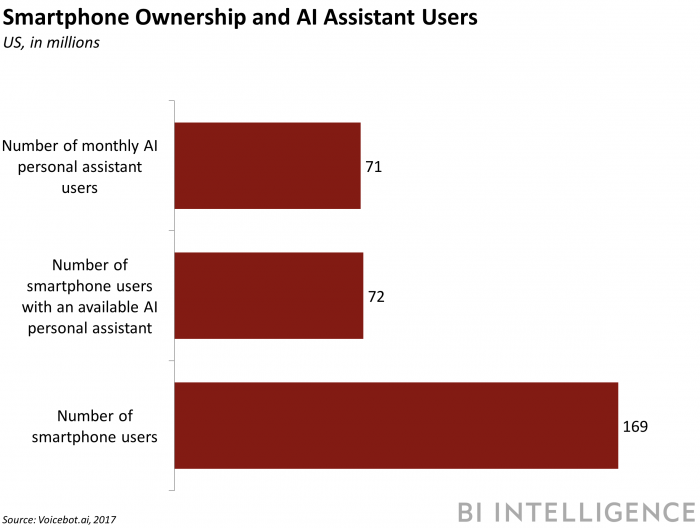Amazon aims to diminish the role of smartphones with Alexa (AMZN)

BI Intelligence
This story was delivered to BI Intelligence Apps and Platforms Briefing subscribers. To learn more and subscribe, please click here.
Amazon is seeking ways to expand the scope of its AI-infused voice assistant that will reduce user reliance on smartphones. Amazon’s consumer tech success hinges on this strategy:
The company missed out on the smartphone market, and outside the home, users tend to rely on their phone's native voice assistant — a market controlled by Google and Apple — rather than third-party competitors such as Alexa (available via the Amazon app).
To continue growing its voice platform and keep Alexa competitive, Amazon needs to drain digital time and attention away from smartphones. To accomplish this, the tech giant is seeking new ways apart from smart speakers to host its voice assistant. Here’s how Amazon is hopes to drive the adoption and usage of Alexa sans smartphone:
Creating tabletop smart-screen devices that run Alexa. These devices, like the Echo Show or Echo Spot, display information like the time or the weather on the built-in screen, which can also be used to monitor security cameras or even for video chat. These devices emphasize quick, purposeful interactions that facilitate direct communicate with others via voice calls or games, for instance.
Baking Alexa into connected cars via a series of partnerships with automakers. The car dashboard is another avenue for consumers to interact with voice assistants — Amazon has partnered with both Nissan and BMS to provide owners of these car brands with voice control supported by Alexa. And both Ford and Volkswagen discussed the potential for Alexa connectivity. The new form factor could help Amazon to circumvent smartphones as the device of choice for navigation or setting up a song to play in the car.
Adding more visual elements to Alexa skills. Integrating more visual elements will likely enable users to accomplish more things that otherwise require a smartphone. For example, users can ask Alexa for recipes via an Alexa skill that visually shows and communicates the next step on an Echo device with a smart screen, such as the Echo Show. This would replace the online search function of smartphones used when looking up a recipe.
Shifting the norm for how consumers interact with digital software, content, and services, will help Amazon to solve its lack of a smartphone footprint. One way that Amazon is driving this shift is by enabling its products to do what have traditionally been smartphone tasks. Rohit Prasad, Amazon VP and Head Scientist at Alexa Machine Learning, echoed this sentiment and said that voice or video calling on Amazon’s devices will help to reduce the need for a smartphone. And another is by making Alexa more useful and more ubiquitous as voice usage surges. By 2020, voice will account for 50% of all mobile web searches.
Laurie Beaver, research associate for BI Intelligence, Business Insider's premium research service, has written a report on the end of apps that assesses the evolving app landscape, examines how the existing app model is threatened by the decline of broad app usage, profiles the promising new tech in the space across Apple, Facebook, and Google, and explores barriers standing in the way of user adoption.
To get the full report, subscribe to BI Intelligence and gain immediate access to this report and more than 250 other expertly researched reports. As an added bonus, you'll also gain access to all future reports and daily newsletters to ensure you stay ahead of the curve and benefit personally and professionally. >> Learn More Now
See Also:

 Yahoo Finance
Yahoo Finance 
